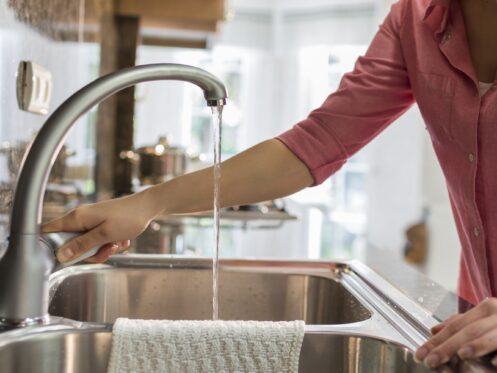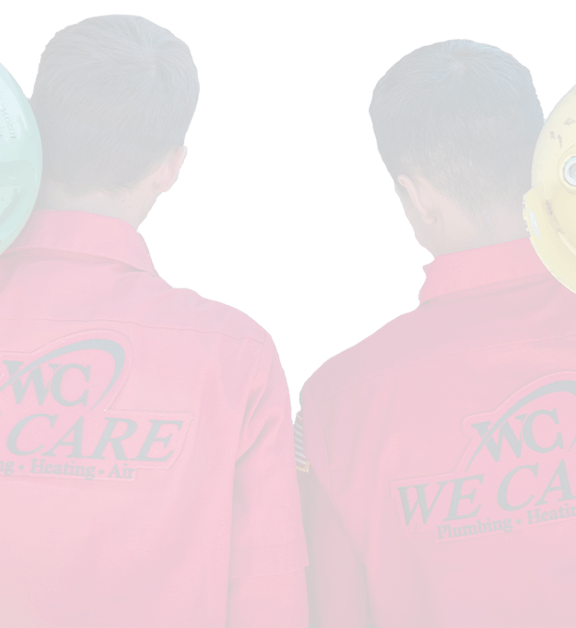Water softeners are essential appliances in many households, helping to tackle the issue of hard water and its detrimental effects. If you’re a new homeowner, there are some things you should do to ensure that your water softener continues to function efficiently and provide you with high-quality softened water! These things go for current homeowners, too! In this blog post, we’ll dive into a comprehensive guide of maintenance tips for your water softener, helping you extend its lifespan and maintain its optimal performance.
Regular Checkups
Just like any other appliance, your water softener requires periodic checkups. Set a schedule to inspect the system at least every three to six months. Look for any signs of leaks, cracks, or wear and tear. Addressing small issues early can prevent more significant problems down the line. The more important inspection, however, is to make sure you have an experienced plumber (like the ones at We Care!) do a full professional tune-up.
Salt Level Monitoring
Most water softeners use salt to regenerate the resin beads that remove hardness minerals from the water. Regularly check the salt levels in the brine tank and ensure there’s enough to facilitate the regeneration process. Keeping the salt at an adequate level ensures your water softener functions properly. This is something your We Care plumber can assist with!
Clean the Brine Tank
Over time, salt bridges or mushy salt can form in the brine tank, which can disrupt the regeneration process. A handy homeowner can periodically clean the brine tank to prevent these issues, or this can be done during your professional maintenance visit. It starts with turning off the water softener and carefully scooping out any remaining salt. Then, warm water can be used to dissolve any salt buildup at the bottom of the tank. Lastly, the tank needs to be refilled with clean salt and restarted.
Resin Bed Maintenance
The resin bed is a crucial component of the water softener that requires attention. Resin beads can become coated with minerals, reducing their effectiveness in softening water. You might consider adding a resin cleaner to the brine tank during regeneration to help remove these deposits and keep the resin bed in optimal condition.
Check the Salt Bridge
A salt bridge occurs when a hard crust forms above the water level in the brine tank, creating an empty space beneath it. This prevents the salt from properly dissolving and regenerating the resin beads. Handy homeowners may be able to use a tool to gently break up the salt bridge and ensure that salt can freely mix with water, but this is something you may want to leave for your We Care expert.
Regeneration Frequency
The regeneration process is vital for maintaining the efficiency of your water softener. However, the frequency of regeneration depends on water hardness and usage. Adjust the settings on your water softener to match your household’s needs. If you’re unsure, consult your user manual or ask your We Care pro for guidance!
Maintain Proper Drainage
During the regeneration process, excess water and brine are flushed out of the system. During maintenance, we ensure that the drain line is free from clogs or blockages to prevent backups and flooding. In addition to blockage, you can check the drain line for any dirt or physical damage on the line itself. When in doubt, call in the pros!
Protect During Freezing Temperatures
If you live in an area with freezing temperatures, you’ll want to take precautions to prevent your water softener from freezing. Insulate the pipes and tank, and consider installing a heat source in the vicinity. Frozen components can lead to cracks and irreversible damage.
Professional Servicing
While there are several maintenance tasks you can handle on your own, it’s a good idea to schedule professional servicing annually or as needed. A professional plumber can perform a thorough inspection, clean the system more comprehensively, and address any underlying issues you might have missed.
Know When to Replace
Even with diligent maintenance, water softeners have a lifespan. If you notice a significant decline in water softening performance, constant repairs, or your system is over a decade old, it might be time to consider a replacement. Newer models are often more energy-efficient and can provide better results. If you’re curious if a new water softener is right for you, we’d be glad to walk you through your options and provide an honest opinion.
Water Quality Testing and Adjustment
While your water softener plays a significant role in improving water quality, it’s essential to periodically test your water to ensure that the softening process is effective. We can test for water hardness and other potential contaminants that might not be addressed solely by the water softener. If necessary, additional filtration systems can be installed to complement the water softener and provide comprehensive water treatment.
Testing Water Hardness
Our team can use a water testing kit to measure the hardness of your water. This will help you determine if your water softener is performing adequately. If you notice an increase in water hardness, it might be a sign that the resin bed needs cleaning or regeneration frequency needs adjustment.
Additional Filtration
Water softeners primarily target hardness minerals, such as calcium and magnesium. However, they might not effectively remove other contaminants like chlorine, sediment, or heavy metals. Depending on your water source and specific needs, you may consider having a water filtration system installed to address these issues and ensure your water is safe and enjoyable to use.
User Manual and Documentation
The user manual that came with your water softener is a valuable resource. It provides detailed information about the specific maintenance requirements and recommended procedures for your model. Keep the manual in an accessible place and refer to it whenever you have questions or need guidance. Familiarize yourself with the settings, regeneration process, and troubleshooting steps outlined in the manual.
Consistent Cleaning Routine
In addition to the major maintenance tasks mentioned earlier, it’s essential to maintain a consistent cleaning routine for your water softener. Wipe down the exterior of the unit regularly to prevent dust and debris buildup. Keep the area around the water softener clean and free from clutter to ensure proper airflow and ventilation. A clean environment contributes to the overall efficiency and longevity of the system.
Check for System Updates
Just like any other technology, water softeners can benefit from updates and improvements. Check with the manufacturer or the company you purchased the unit from to see if there are any firmware updates or new features available for your model. Keeping your water softener’s software up-to-date can optimize its performance and functionality. This is something your We Care expert can handle for you.
Educate Household Members
Make sure everyone in your household is aware of the importance of proper water softener maintenance. Educate your family members about the do’s and don’ts, such as avoiding using excessive amounts of salt or putting foreign objects into the brine tank. When everyone understands the basics of water softener care, it contributes to the overall effectiveness of the maintenance routine.
Consult an Expert Today!
Your water softener is an investment that pays off in improved water quality and appliance longevity. By following these maintenance tips, you can ensure that your water softener continues to function efficiently, providing you with the benefits of softened water for years to come. Regular checkups, monitoring salt levels, cleaning the brine tank, and attending to the resin bed are all part of a holistic maintenance routine that will keep your water softener operating at its best.
Remember, a well-maintained water softener leads to better water quality and a happier, healthier home. If you are in the Southern California region, contact We Care today to schedule a thorough inspection and, if necessary, repair of your water softener!
Author Bio: Rusty Cochran
 Rusty Cochran is the President of We Care Plumbing, Heating and Air Conditioning. We Care began humbly, operating in his family’s living room. Under Rusty’s strong leadership, We Care has grown from 2 employees to over 200 employees. We Care Plumbing, Heating and Air has gained recognition across the HVAC industry, receiving numerous awards and certifications, including being named the ACCA Contractor of the Year, The Map Presidential Award several times, Angie’s List Super Service Award, NATE certification, and multiple Dave Lennox Awards. LinkedIn Profile
Rusty Cochran is the President of We Care Plumbing, Heating and Air Conditioning. We Care began humbly, operating in his family’s living room. Under Rusty’s strong leadership, We Care has grown from 2 employees to over 200 employees. We Care Plumbing, Heating and Air has gained recognition across the HVAC industry, receiving numerous awards and certifications, including being named the ACCA Contractor of the Year, The Map Presidential Award several times, Angie’s List Super Service Award, NATE certification, and multiple Dave Lennox Awards. LinkedIn Profile







